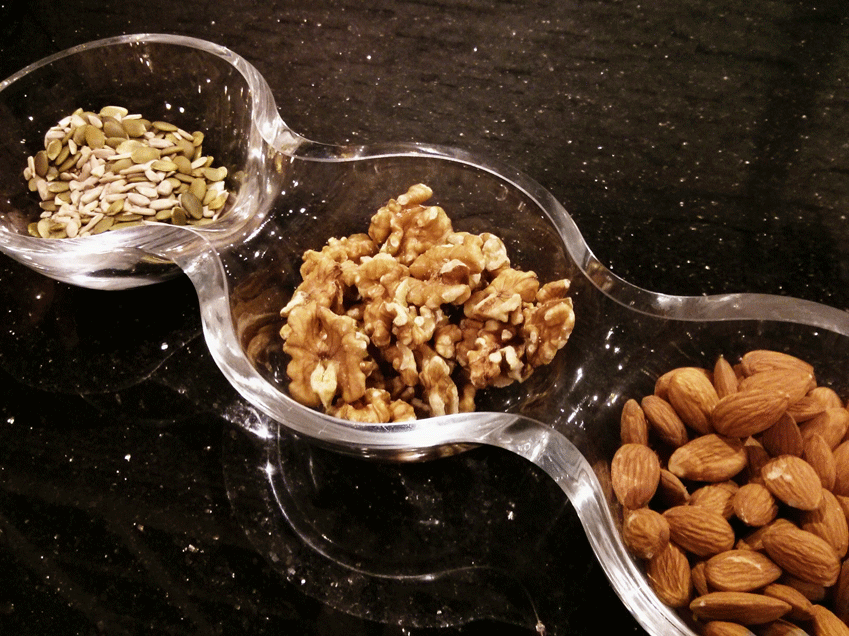In this article I aim to shed light on some of the common misconceptions about fat. Our society has been wrongly led to believe that consuming fats are bad for us. Not only is that untrue, it’s dangerous. Good fats are needed by our bodies for a number of reasons. Here are just some of the more common myths we hear and why they’re simply untrue.
Myth: Eating Fat makes you Fat
Fat is an essential part of every single one of your cell membranes and is also required in order to properly digest fat soluble vitamins. We need good quality fats as a source of energy and to help manage inflammation in our bodies. Inflammation is one of the main reasons why we have so many diseases today. Eating “good” fats make us feel fuller quicker and longer – craving less of the foods our bodies don’t need. The real culprit to gaining unnecessary weight are sugars and refined carbohydrates (think white, processed foods) – when we eat sweets our blood sugar and insulin levels spike. Three things happen when we have too much insulin in our bodies: we’re constantly hungry, we block our body’s ability to burn fat – contributing to aging, and our body stores sugars as fats and we actually end up craving even more. By eating good fats like nuts, seeds, avocados, olive and coconut oil, we are less likely to have these cravings.
Myth: Saturated Fat is Bad for you
“Simplistic and inaccurate half-truths that serve advertising and sales efforts have created confusion. We need clear, factual information in simple English.” – Udo Erasmus, Fats that Heal – Fats that Kill
Not too long ago we were wrongly told that all fats are bad. People still make the untrue connection that eating fat leads to being fat; this is simply untrue and can have horrible health consequences. Saturated fats are needed by our bodies for a number of reasons. Study after study have continued to show that there is no correlation between consuming saturated fats and cardiovascular diseases.
Saturated Fats also help promote your liver health as they aid as protection from alcohol, drugs, and medications. Your lungs also benefit; your lungs are coated in a surfactant which is 100% saturated fatty acids. By not eating these fats, this layer can collapse your airspace and distress your respiratory system.
Saturated fats are also essential to your nervous system and ultimately the signals responsible for your metabolism and managing insulin releases. We also need saturated fats in our white blood cells to maintain strong immune health, and finally – our brains. Our brains are made mostly of fat (60%!) and cholesterol . We now know that we need essential fatty acids (like in your salmon) for proper brain and nerve function, but the bulk of the fatty acids in your brain are indeed saturated – we need to feed our brain these fatty acids!
Myth: Margarine is Better for you than Butter
There’s an old saying – You should never eat a food that has to pass through a chemistry lab on the way to your mouth. As we just touched on, Margarine was born when doctors started wrongly claiming that saturated fats were a no-no. True butter has one ingredient – churned cow’s milk. Margarine is highly processed and is primarily made with vegetable oil which is normally a liquid at room temperature. To make it solid, margarine usually is hydrogenated, turning some of the oil into harmful trans fats which interfere with your normal biochemical processes. Even if margarine is labelled as trans fat free (they can make the claim if there’s less than 0.5 grams per serving), the oils margarine are made with are often high in Omega-6 fatty acids – which we already consume too much of. Other studies have even linked the consumption of polyunsaturated vegetable oils with a host of other problems; cancer, violence, and yes… even heart disease.
Myth: Low-fat Foods are Better for you
When fat is taken out of food, the taste often goes with it. Food companies replace this with sugar – which as we described above is actually worse for gaining fat than consuming fats in your diet. Many low fat foods are heavily processed and very low in essential vitamins and minerals. Relying on these foods can lead to deficiencies and many other health problems. On top of being full of additives and sweeteners, low-fat foods are usually laced with high fructose corn-syrup!
Myth: Eating Fat will Raise your Cholesterol
Recent evidence does not support this old claim that has been engrained in our society. We have anywhere from 1,100 to 1,700 milligrams of cholesterol in our bodies. Upwards of 75% of that can be produced inside of our bodies by our liver, the rest comes from our diet. Most people actually don’t see spikes in cholesterol from consuming cholesterol, and if they do, they are usually very short lived. The majority of the cholesterol in our foods actually can’t be absorbed by our bodies, and our bodies are really good at regulating our cholesterol levels; when our intake goes up our body simply produces less.
Myth: LDL Cholesterol is Bad
Low-density lipoprotein is known as the “lousy cholesterol”, as high levels are known to increase your cardiovascular risk. However, LDL cholesterol also acts as an antioxidant and is needed to waterproof cells and keep cell membranes fluid – our bodies do still need an adequate level, it’s when levels get too high that we have issues. Niacin (or vitamin B3) can actually lower our natural production of LDL which helps to keep our blood fats low. When this happens, we see an increase in cell metabolism which burns more glucose and prevents sugars and starches from turning to fat. You can supplement your diet with sun-dried tomatoes, paprika, bran and chicken to get a good dosage of B3.
Myth: Your Body Doesn’t need Fat
As we touched on above, our bodies simply need fats. But many of us are consuming too much of the wrong types of fats. The average North American’s daily caloric intake is comprised of roughly 45% calories from fat, whereas it should be 25-35%. Good fats like Essential Fatty Acids (EFAs) are fats the body needs to build important structures like cell membranes.
Myth: Coconut Oil is Bad for you
Coconut oil is high in medium-chain triglycerides which help boost metabolism. They also contain lauric acid which converts to monolaurin – together these have positive antibacterial properties; fighting off bacteria, fungi and viruses. Coconut oil is also extremely heat stable unlike many other vegetable oils, making it ideal for high temperature cooking. Additionally, coconut oil can turn to ketone in our liver which provides energy to our brains. In one study, women who consumed coconut oil versus soybean oil actually reduced waist circumference.
Myth: Avocados are Fattening
While most calories from Avocados do come from fat, two thirds of those fats are the heart healthy monounsaturated fats (which are also found in olive oil). Monounsaturated fatty acids which help increase HDL and lower LDL. Avocados have been noted as one of the key contributors to the healthy Mediterranean diet. Not only do they contain healthy fats, avocados are high in fiber, beta carotene, folate and potassium. Plus they’re delicious!
Many of the above misconceptions have been big contributors to North America’s obesity epidemic. I’ve recently begun introducing my clients to a revolutionary diet program which aims to adapt and regulate your diet to bring your hormones and metabolism to their ideal balance. Click here for more information on Metabolic Balance.
What are your thoughts on consuming fats? Share your comments below





I recently started eating much more good fat and protein in my diet and basically cut out all wheat and I’m feeling amazing! I’ve lost a bunch of weight and I feel like I have so much energy. Great article Jane!
Yes! I keep telling people the benefits of Coconut Oil but they’re head is still in the old days.